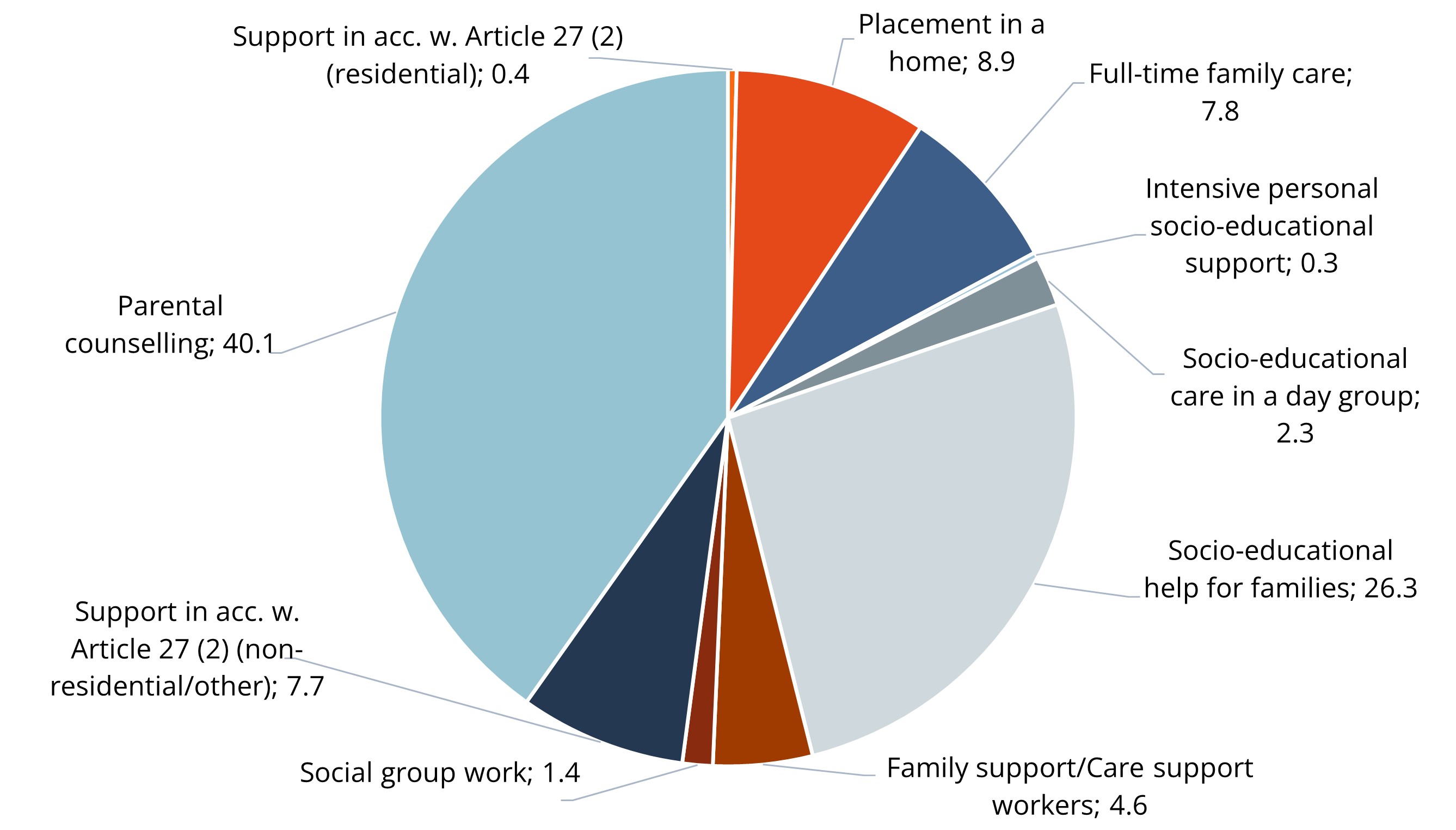Notes
The diagram only refers to the number of minors in receipt of socio-educational support (Article 27, Book 8 of the Social Code [SGB VIII]). It does not include the approx. 143,000 cases involving support for children with a psychological disability in accordance with Article 35a (see in particular Integration support for young people with a psychological disability), nor the large number of approx. 125,000 young adults (Article 41) (see Support for young adults) receiving any forms of support (in particular, alternative residential accommodation).
The breakdown highlights the large variety of socio-educational support services available to minors in accordance with Article 27 et seq. of Book 8, which has not changed substantially in recent years. The current percentage breakdown of types of support provided to a total of 1,002,844 young people under the age of 18 and their families in 2021 demonstrates the continued strong significance of parental counselling in quantitative terms; it accounts for 40.1% and hence the majority of all socio-educational services delivered to under-18s. This is almost certainly because this type of service is directly available to parents and young people without having to submit an application for service provision and funding to the youth welfare office (Article 36a [2]).
When it comes to non-residential support, the so-called socio-educational help for families also plays a major role (Article 31) which in 2021 was provided to more than one quarter (26.3%) of minors in receipt of socio-educational support services. At 7.7%, the next most frequently provided type of service, at quite a remove, was non-residential support in accordance with Article 27 (2) (see further notes below), followed by assistance from family support/care support workers in accordance with Article 30. They accounted for 4.6% of all socio-educational support services. By contrast, social group work (Article 29) and intensive personal socio-educational support (Article 35), which accounted for 1.4% and 0.3%, respectively, played a comparatively insignificant role. Semi-residential support services provided as part of care in a day group (Article 32) were delivered similarly infrequently, accounting for 2.3%.
With 17.1% of under-18s in receipt of socio-educational support services, in 2021 one sixth of children and young people were living in residential care (Article 27 in conjunction with Articles 33, 34 and including residential support provided under Article 27 [2]). In addition to full-time family care (Article 33) and residential care (Article 34), the settings of services provided under Article 27 (2) are not defined in law, but rather are the outcome of efforts to find a necessary and suitable solution for each child or adolescent through individual and creative support service planning (Article 27). This same flexibility and creativity is also applied to non-residential care (see above).
In “Monitor Hilfen zur Erziehung 2023”, AKJStat, the agency for child and youth welfare statistics, published the following data on all forms of support:
• Young males account for 54% of all young people in receipt of socio-educational support services. Overall, young males are slightly overrepresented across all service segments/types of support;
- Single parents at initial delivery of support account for 42.9% of all forms of support received;
- Families in receipt of transfer benefits, i.e. who are at risk of poverty, account for 29.8% of all forms of support received;
- The share of children with at least one foreign-born parent (immigration background) is 36.9%;
- Families with a language other than German at initial delivery of support account for 18.1%.
(See AKJStat, 2023.)
Further reading
- Arbeitstelle Kinder- und Jugendhilfestatistik (AKJStat) (2023): Monitor Hilfen zur Erziehung 2023 – Datenbasis 2021 (last accessed: 31 July 2023).
- Statistisches Bundesamt (2022): Statistiken der Kinder- und Jugendhilfe – Erzieherische Hilfen, Eingliederungshilfe, Hilfe für junge Volljährige 2021. Wiesbaden (last accessed: 31 July 2023).



